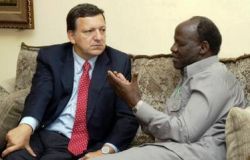EU looks for common ground with Sudan on Darfur
Sept 30, 2006 (KHARTOUM) — Top European Union officials met Sudanese President Omar Hassan al-Bashir on Saturday to try to find common ground on ways to end the military crisis in Darfur and ease one of the world’s worst humanitarian crises.
 “We need to work together so that we can have real peace in Darfur,” European Commission President Jose Manuel Barroso said as he left the presidential palace in Sudan’s capital Khartoum.
“We need to work together so that we can have real peace in Darfur,” European Commission President Jose Manuel Barroso said as he left the presidential palace in Sudan’s capital Khartoum.
“It was very important to understand the point made by the president of Sudan. I also conveyed to him very frankly and very openly our concern about the situation,” Barroso added.
International efforts to end more than three years of conflict in Sudan’s vast west have intensified in recent weeks.
The African Union peacekeeping mandate in Darfur, which expired on Saturday, was extended to December 31. The United Nations Security Council has passed a resolution to send 20,000 U.N. troops to replace the 7,000 AU forces in Darfur.
But Bashir has rejected the mission transfer saying it was a violation of Sudan’s sovereignty and an effort by the West to colonise the African oil producing country.
With discussions over the U.N. troops seemingly at a standstill, some diplomats and aid workers have suggested an alternative to the U.N. force which has been called AU-Plus. It would amount to an extended AU mission with enhanced policing powers and greater support from the United Nations.
Barroso’s approach to Sudan was markedly less confrontational than that of the United States in recent days. U.S. Secretary of State Condoleezza Rice on Wednesday told Sudan it must choose between “cooperation or confrontation” and accept a U.N. presence in Darfur.
Barroso did not mention the U.N. peacekeepers during his brief remarks and a Sudanese official when asked about U.N. forces deflected the question and said pressure should be placed on Darfur rebels to sign a peace agreement.
PEACE EFFORTS ABANDONED
A peace deal was signed in May by the Sudanese government and one Darfur rebel group but rejected by other factions but analysts say violence has only increased since.
“Currently both sides of this are trying to solve the conflict militarily,” EU envoy to Sudan Pekka Haavisto told Reuters.
“This is of course as far off the peace agreement as possible. We are giving both sides the message you should act in a disciplined way, you should give peace a chance.”
Haavisto said part of the EU’s goal in Khartoum during the trip, which will also take the delegation to Darfur, was to try to understand the Sudanese objections to U.N. troops.
“We have to think seriously what are the real concerns of the government behind this? Is there some particular element in the U.N. resolution … touching their sovereignty?” he said.
Some 200,000 people have died and more than 2.5 million people have been displaced since rebels in Darfur took up arms in 2003, accusing the Khartoum government of neglect.
The head of the Cairo-based Arab League, Secretary-General Amr Moussa, was also due to travel to Sudan on Monday for talks with Bashir over Darfur, a League official said on Saturday.
Arab diplomats have said that Egypt and the Arab League, of which Sudan is a member, were trying to persuade Khartoum to accept U.N. troops.
Many countries are worried that the conflict in Darfur could eventually threaten other parts of an already unstable region.
On Saturday, Ethiopia accused its traditional foe Eritrea, where some Darfur rebels are based, of destabilising Darfur.
“I have no reason to believe Eritrea has a boundary with Darfur but Eritrea is deeply involved in the destablisation of Darfur … by training and arming Darfur opposition groups,” Ethiopian Prime Minister Meles Zenawi told a news conference in Addis Ababa.
(Reuters)
